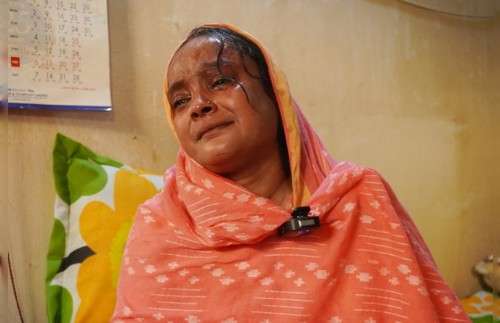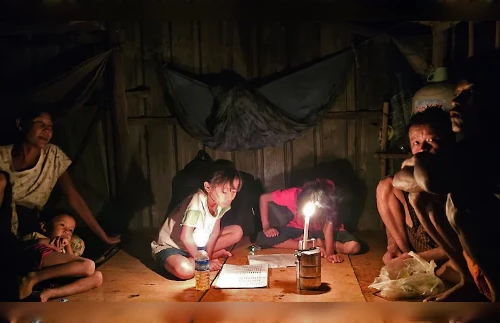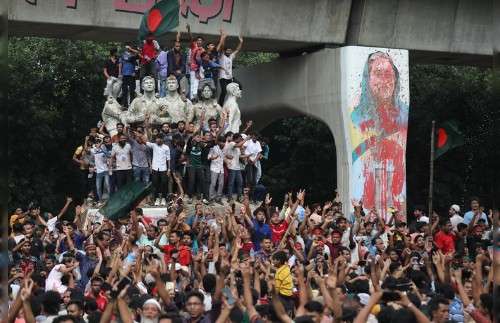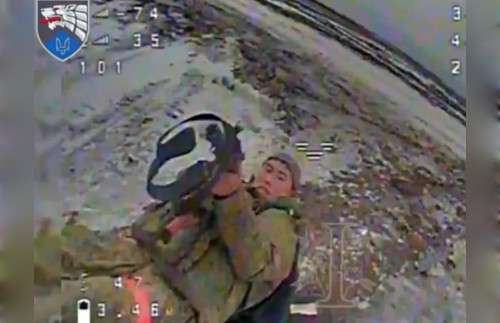John Bechtel and Reyad Hossain/Washington and Dhaka

In the decade since the Rana Plaza disaster, local and international labor advocates acknowledge that safety in Bangladesh’s garment factories has improved.
Still, “unethical” purchasing practices of global buyers are harming garment workers and factories, they say, while non-garment industrial factories are far behind in safety improvements because of a lack of similar global attention.
The April 24, 2013, collapse of the eight-story Rana Plaza, a factory on Dhaka’s outskirts that produced garments for global brands, killed more than 1,100 people. The tragedy sent shock waves across the international fashion industry and prompted widespread calls for accountability from brands, factories and governments.
A couple of path-breaking actions resulted, said a recent study by the Stern Center for Business and Human Rights at New York University.
“In the wake of Rana Plaza, two international initiatives – the Accord on Fire and Building Safety in Bangladesh and the Alliance for Bangladesh Worker Safety – have spurred significant improvement in the more than 2,300 export-focused factories they covered between 2013 and 2018,” said the study released on April 11.
However, the report noted that after the COVID-19 pandemic, global buyers resorted to unethical buying practices contradicting their earlier commitment, including pressuring suppliers for unreasonable price reductions, withholding payment and canceling bookings.
Buyers now are facing calls for accountability from garment producers.
Meanwhile, domestic labor advocates argue that while persistent international scrutiny helped make the garment industry safer for workers, other labor-intensive sectors in the country remain as dangerous as ever.
Since 2014, as many as 4,360 workers have died in explosions, fires and other accidents in non-garment factories, according to the Safety and Rights Society (SRS), a Dhaka-based non-profit organization.
“Due to pressure from international buyers and other stakeholders, the government has paid special attention to the garment sector. As a result, the factory owners were compelled to ensure safety for workers,” Sekender Ali Mina, executive director at SRS, told BenarNews.
“But other industrial sectors have not been under similar international scrutiny. Therefore, safety for workers in those sectors remained neglected.”
Partnership ‘broken’
The Stern Center’s report, titled “A Broken Partnership: How Clothing Brands Exploit Suppliers and Harm Workers – And What Can Be Done About It,” praised the improvements made in the Bangladesh garment industry over the last 10 years, but accused global buyers of not keeping their part of the bargain.
During the five years following the collapse, apparel buyers agreed to maintain order volumes with Bangladeshi suppliers that committed to fixing structural and fire-related issues uncovered by safety inspectors paid by the initiatives, the report said. Manufacturers who did not comply would see their business relationships with international buyers terminated.
That pressure from buyers was crucial in reducing safety concerns in readymade garment factories. Since then, the industry, which employs millions of low-wage workers, has only seen a handful of safety-related incidents.
In 2017, a garment factory in Gazipur suffered a boiler explosion that killed 13 people. Another factory in Dhaka suffered a fire but did not see significant casualties.
In contrast, other industrial factories in the country have seen catastrophic disasters. In the past year alone, the deadliest in a decade, 712 workers died.
Buyers blamed
The Stern Center study said buyers – who pressured factories into costly compliance – have become the bad actors.
“Beginning in spring 2020, Western clothing brands delayed or canceled orders from their suppliers in South and Southeast Asia, resulting in layoffs of hundreds of thousands of workers,” it said.
The study noted that corporate buyers dropped more than U.S. $3 billion in orders at the onset of the COVID-19 pandemic in March 2020. Bangladesh factories were running at 55% capacity by June of that year. Around the same time, 75% of respondents to a BRAC survey reported they struggled to feed themselves and their families.
As many as 1 million of the nation’s more than 4 million garment workers were furloughed or laid off because of COVID-19, it said.
As the pandemic eased in January, factory workers expressed frustration about their wages.
One said that “it is almost impossible to live on 8,000 taka,” or about $75 a month, which is the legally required minimum wage in Bangladesh, according to the study.
Economic pressures remained in the fourth quarter of 2022, factory owners in Dhaka told NYU researchers. Others said customers continued to cancel major orders.
“In one case, the buyer had booked factory capacity for an order of several million pieces, but cancelled the booking when its business was not going well,” the study said.
Still, factory owners conceded they could do more to strengthen their bargaining position, thereby shielding workers. One owner told the researchers that buyers can take advantage of suppliers.
“We also need to become better negotiators with the brands, which also will reduce our reliance on buying houses who we now are paying to negotiate for us. We also need to move more into the [consumer] market, selling our products directly to global customers,” the study quoted the unnamed owner as saying.

Meanwhile, four of 10 apparel brands and retailers contacted for comment by the researchers on the report responded.
One of those companies, New York-based PVH Corp., challenged allegations that it took advantage of suppliers.
“PVH does not and has never in the past, pressured suppliers for price reductions after the orders have been issued. The price negotiation is concluded well ahead of production, and the supplier always has option to accept or reject the orders that are placed by PVH, at agreed prices,” it said in a statement partially published in the report.
“Moreover, once orders are issued, PVH is 100% committed to taking responsibility for goods ordered and will not withhold payment for any reason whatsoever.”
Nonetheless, garment producers are stepping up to hold buyers accountable.
In 2021, Bangladesh factory owners became part of the Sustainable Terms of Trade Initiative (STTI), a group that aims to make purchasing practices more sustainable.
Fazlee Shamim Ehsan, vice president of Bangladesh Knitwear Manufacturers & Exporters Association (BKMEA), told BenarNews: “STTI aims to ensure that unethical purchasing practices are stopped not only in Bangladesh but across the world. Its goal is to ensure sustainable purchases and proper working conditions for workers.
“By 2025, relevant governments and organizations will be made aware of the importance of ethical purchase practices so that they can serve as the basis for legal protections,” he said.
Justice delayed
Two years after the collapse, authorities charged plaza owner Sohel Rana, along with 40 others including 12 government officials, with murder, but the trials have not been completed.
On April 6, 2023, the High Court granted bail to Rana, but a separate bench of the same court nullified the order following criticism.
“After the death of 1,138 workers, what more evidence does it take for the trial to conclude? The trial should have been completed in six months,” Kalpona Akter, a prominent labor leader, told BenarNews.
“The fact that the trial is still going on after 10 years shows nothing but disrespect for slain workers.”
Copyright ©2015-2022, BenarNews. Used with the permission of BenarNews.














